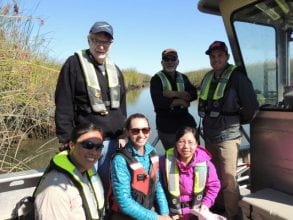Welcome
The Institute of Environmental Toxicology & Chemistry (IETC) is a research facility in the College of the Environment at Western Washington University (Western). IETC supports the college’s Department of Environmental Sciences and the mission of the university by providing instructional services and training to undergraduate and graduate students in the field of environmental toxicology and chemistry. Each year, IETC awards the Ming-Ho Yu Environmental Toxicology Scholarship Award for Best Outstanding Student in Environmental Toxicology. The award recognizes the undergraduate student in the B.S. Toxicology Emphasis program who excels academically as well as shows the leadership and research skills that promise an outstanding career in the field.
IETC also provides research opportunities and training for students (undergraduate and graduate), other faculty, and visiting scientists in its laboratory facilities. Since its inception, IETC has been highly successful in obtaining grant funding from local, state, federal, and international sources, as well as from industry, citizen groups, and foundations. This funding is used to support and actively engage graduate and undergraduate students’ participation in IETC research projects.
Students working on research projects in the environmental contaminant sciences obtain hands-on skills and training as part of a graduate student’s Master of Science theses research project or an undergraduate’s senior research or internship project.
History
IETC was established in 1989 and directed by Dr. Wayne Landis from 1989 to 2021. Dr. Landis’ primary research focus was on conducting regional-scale ecological risk assessments using methods developed by Dr. Landis and his research team. This methodology has been used to assess the effects of chemicals, stormwater runoff, acid mine drainage, non-indigenous species, forest, mining, and agricultural land use management practices, microplastics, and climate change, to name a few, on aquatic, marine, and terrestrial systems at the landscape scale. It has also been adopted by numerous scientists in Europe, China, Africa, New Zealand, Australia, and Brazil. Other IETC research projects managed by Dr. Landis during this time included conducting aquatic and terrestrial laboratory toxicity tests, as well as ecosystem-level toxicity tests using laboratory microcosms and outdoor mesocosms, and developing models to analyze complex environmental datasets. Dr. Landis continues his research program as Professor Emeritus.
In 2022, Dr. Ruth Sofield became the Interim Director of IETC. The focus on student academics and research will continue as IETC evolves.
